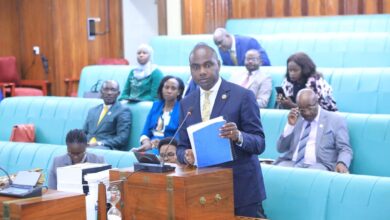Local News
Kadaga petitioned over Exim Bank land
A whistleblower complaint claims Pine Investments, a company owned by a minister, has been unfairly propped up to prevail over three other companies in a bidding war for the sale of about two to three acres of land in Kampala to government to build the headquarters of Afro Exim bank in Uganda.
Afro Exim Bank is a bank, which lends money to largely government institutions to run public projects. The bank apparently approached the president seeking to set up shop here. The president granted its prayer but only on condition that the bank’s headquarters are based here.
When the bank officials agreed to the condition, the president asked the ministry of Finance to look for prime land within the city for Afro Exim bank to build its head offices. According to the whistleblower complaint, the ministry of Finance in October 2019 advertised a tender for the purchase of two to three acres of land at the urging of President Museveni for Afro Exim Bank to build its headquarters.
The four dueling companies include; Pine Investments Co, Vara Enterprise, Imperial properties and SGL. So far Pine Investment Co. which is co-owned by a minister seems to have the upper hand. It has the priciest land of all the four bidders. It’s offering 2.2 acres at Maccanonrd near Nakasero Primary School (Intervac Road) at $4 million approximately Shs 14.8 billion per acre.
Vara Enterprise is offering 2.4 acres in Bugolobi and each acre is priced at $3.1 million or Shs 11.5 billion. SGL has three acres in Kololo Lugogo bypass on the main road with three access roads. It is selling an acre for $ 2.7 million or Shs 9.9 billion.
Imperial Properties is offering 2.8 acres on Queen Elizabeth Avenue Residential Area. We couldn’t establish its price. The whistleblower complaint roundly queries Pine Investments Co. quotation of $4 million per acre.
“There is no land in Kampala ever bought or sold at $4m per acre, this is way overly priced and marked with political influence. The attorney general Byaruhanga William, is a shareholder of Pine Investments. Afro Exim bank is housed in the building of Pine Investments in Nakasero at Rwenzori Towers.”
The complaint addressed to the speaker of parliament Rebecca Kadaga also firmly requests her, “…to stop the loss of taxpayers’ money and advise the ministry of Finance and government valuer to stop awarding the bid to Pine Investments and choose a winner on the basis of correct valuation and merit of location/commercial area on the main road and above all easy accessibility of the bank to its customers.”
The whistleblower complaint claims Pine Investments is leaning on minister of Finance to nudge the Government chief valuer to sign off the deal in Pine Investments favour. The valuation Committee, according to the whistleblower had rejected Pine Investments bid for two reasons; it is overpriced and encumbered. But Pine Investment has leaned on its powerful shareholder to muscle through its bid.
According to the whistleblower, the government valuer received only one bid to sign off and that was Pine Investments’ bid.
Interviewed for a comment yesterday, attorney general William Byaruhanga acknowledged being a director of Pine Investments Co, but said he is not aware his company is selling land to government without following proper procurement processes.
“I am not aware about Pine Investments selling land to government though I am one of the directors in that company. I can only advise you to contact the finance ministry for clarification,” he said.
Interviewed for this story yesterday, Finance minister Matia Kasaija said the land that was allocated to Afro Exim Bank was government land located in Nakawa and not bought from any other person.
“We did not contact or advertise any bid to buy land for Afro Exim Bank. The land that we allocated to the bank has been owned by government and is located in Nakawa,” he said.
Kasaija also challenged the whistleblower to present evidence indicating that his ministry wrongly bought land from Pine Investments without following the right procurement procedures.
SOURCE : The Observer




